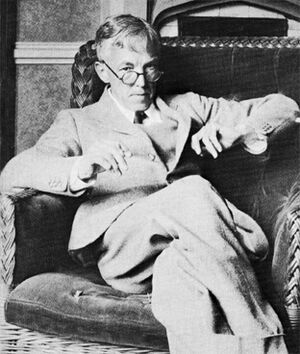G. H. Hardy (nonfiction): Difference between revisions
Jump to navigation
Jump to search
No edit summary |
No edit summary |
||
| (One intermediate revision by the same user not shown) | |||
| Line 13: | Line 13: | ||
== Fiction cross-reference == | == Fiction cross-reference == | ||
* [[Crimes against mathematical constants]] | |||
* [[Gnomon algorithm]] | |||
* [[Gnomon Chronicles]] | |||
* [[Mathematician]] | |||
* [[Mathematics]] | |||
== Nonfiction cross-reference == | == Nonfiction cross-reference == | ||
| Line 20: | Line 26: | ||
* [[Srinivasa Ramanujan (nonfiction)]] | * [[Srinivasa Ramanujan (nonfiction)]] | ||
External links | == External links == | ||
* [https://en.wikipedia.org/wiki/G._H._Hardy G.H. Hardy] @ Wikipedia | * [https://en.wikipedia.org/wiki/G._H._Hardy G.H. Hardy] @ Wikipedia | ||
Latest revision as of 05:16, 1 December 2020
Godfrey Harold "G. H." Hardy FRS (7 February 1877 – 1 December 1947) was an English mathematician, known for his achievements in number theory and mathematical analysis.
In biology, Hardy is known for the Hardy–Weinberg principle, a basic principle of population genetics.
In addition to his research, Hardy is remembered for his 1940 essay on the aesthetics of mathematics, entitled A Mathematician's Apology.
He was the mentor of the Indian mathematician Srinivasa Ramanujan.
In the News
Fiction cross-reference
Nonfiction cross-reference
- Harald Cramér (nonfiction) - influenced by Hardy
- Mathematics (nonfiction)
- Srinivasa Ramanujan (nonfiction)
External links
- G.H. Hardy @ Wikipedia
